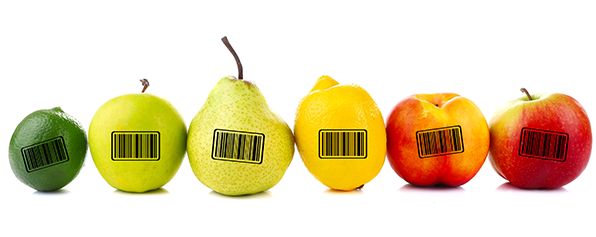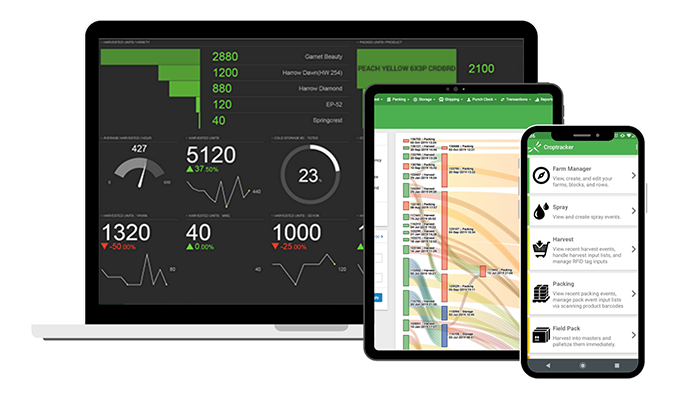What is Farm Record Keeping?
Detailed farm record keeping is crucial when making important business or planning decisions for your operation. Not only is it a poor business practice to not keep records of farming activities, but it can be illegal not to keep your records in order.
Farm records can include any of the following: expenses, labor, chemical/pesticide tracking, harvest and yield records, planting records, shipping records, FSMA and GlobalGAP compliance records, and more.
Traceability plays a huge role in practicing safe farming, as it is always important to be able to look back and see the full history of product, from planting to shipping. Keeping your records in good order will vastly simplify this process, and make auditing season a breeze.
Why Keep Records:
At a minimum, growers must keep records to comply with legal requirements for taxes and restricted chemical use applications, but additional record keeping is a valuable tool. Many growers track their expenses, from equipment runtime, to labor costs, to chemical and fertilizer costs. Tracking labor, equipment, and chemical costs enable you to make informed decisions when pricing your products to ensure greater profits.
Harvest yield records can be used to compare crop yield from year to year, to help growers make educated decisions regarding crop management in the future. You can’t manage what you can’t measure, so record keeping around harvest quantity is essential to growers tracking their income against cost of production.
Pesticide and Spray records are absolutely essential for both food and worker safety. Records of spray dates, chemicals used, and safety intervals suchs as the re-entry interval and the pre-harvest interval protect your customers and employees from exposure to potentially harmful residues. In many countries, chemical use reporting is mandatory to comply with regulations around food and environmental safety. Chemical use tracking is also a key part of tracking overall farm expenses.
Labor Tracking and worker productivity records are an aspect of record keeping that are essential for managing payroll and piecemeal payouts for your farm workers. More efficient payroll record keeping can save valuable time and money by speeding up the payroll process. Effectively tracking piece-rates for harvest can motivate workers, and make assessing overall productivity easier.
Many farms that employee temporary foreign workers are legally obligated to track not only hours worked, but hours offered to their employees, in addition to the usual hourly and overtime tracking, and to maintain detailed records of all employee activities on the farm.
Food safety and traceability are a growing concern for growers and consumers worldwide. The Global Food Safety Initiative, or GFSI, established in 2000 sets global food safety standards, and certifications that demonstrate that produce has passed its rigorous food safety standards. Global Good Agricultural Practices (G.A.P.) is the most widely used international standard for farm production, and includes standards for food safety and traceability, environmental protection, worker safety and welfare, animal welfare, and more.
Produce sold in the USA must additionally meet the FDA’s Food Safety Modernization Act (FSMA) standards.

To meet these standards, a rigorous auditing and record keeping system is required, to ensure safety and traceability of products being sold to consumers worldwide. Effective record keeping is also a must for an easy auditing season. The more accurate and precise records you have available for an auditor, the quicker and easier the process will be.
Global Regulations for Recording:
Regulations for food safety and record keeping can vary depending on the region. Chemical application laws for instance, are established regionally.
In the United States pesticide use is restricted by the 1990 Farm Bill which states that “all private applicators (those who apply pesticides to their own land) must maintain records of restricted-use pesticide (RUP) applications.”
In the EU, a comprehensive body of legislation regulates the use of plant protection products such as pesticides and their residues in food. Maximum Residue Levels, or MRLs, are the upper limit of chemical residues on food as set by the European Food Safety Authority (EFSA).
In New Zealand, agrichemicals are controlled as hazardous substances and must be used in such a way as to minimize environmental effects.
In Canada, chemical and pesticide use are regulated federally, with additional regulations at the provincial level if applicable. Canada GAP certification requires detailed record keeping for all agricultural chemical purchasing and receiving, application and storage.
The importance of record keeping regarding chemical and pesticide use cannot be overstated for growers of commercial fruit and vegetables.
Loans and Grants
When applying for grants or loans, whether as a small farm or a large business, detailed financial information and records are often required, either to determine eligibility or to prove that a farm is financially stable. Financial records, income statements, and expenses should all be up to date. Tracking farm income and expenses isn’t just important for your bank records though, good records will help you determine profits and identify any inefficiencies in your business.
Record Keeping Methods:
In addition to the classic paper record keeping, there has been a recent trend for farmers to go digital with their record keeping, using spreadsheets, orchard management software, or farm management software to manage the extensive data collection they need.
Digital record keeping can range from simple excel spreadsheets and basic calculations to online data management tools.
Another popular trend in farm record keeping is the use of farm management apps. Farm management apps and other apps for farmers aim to make farm record keeping easier and more reliable using digital recording, with records often stored in the cloud for easy access from anywhere. Farm management apps range in complexity, from simple mobile farm record keeping spreadsheets to fully integrated recording systems stretching from planting to sale.

How record keeping helps farmers:
Keeping accurate farm records is crucial to growers who want to measure their efficiency and progress throughout the year. With comprehensive records, time spent on administrative work such as payroll and audits can be drastically reduced.
Better records also mean a better understanding of the strengths, weaknesses, and productivity levels around the farm, and can provide insight into best practices going forward. Food safety and traceability, topics at the forefront of the consumer consciousness, can be enhanced exponentially with effective recording processes.
Organized record keeping can cut audits down from a few days to a few hours, and these audits can allow growers to achieve food safety certifications, which in turn expand market access.
Data collection drives growth - as long as you can understand what your data is telling you.
Interested in learning more about Croptracker? Learn more about our Farm Management Software, or book a demonstration to schedule a meeting with our product experts.
And as always, if you're ever stuck, never hesitate to e-mail us at support@croptracker.com or Live Chat with us by clicking the green speech bubble ![]() in your bottom right-hand corner. We're always happy to help you make the most of Croptracker to make your farm more efficient, safer, and more profitable!
in your bottom right-hand corner. We're always happy to help you make the most of Croptracker to make your farm more efficient, safer, and more profitable!

